#jann wenner
Text
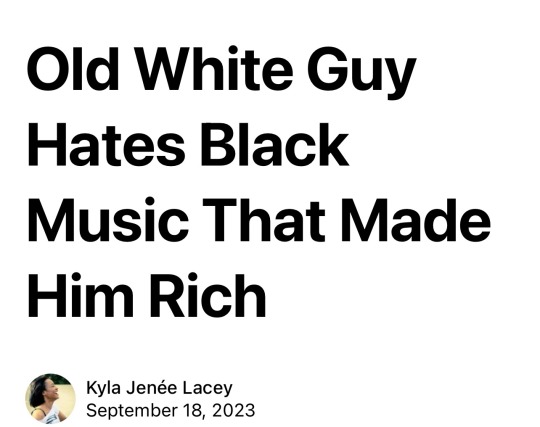
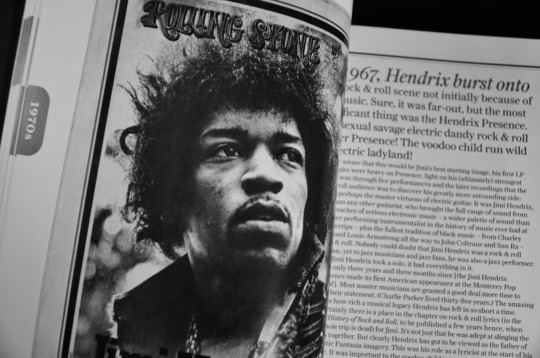
“Jann Wenner, the founder of Rolling Stone magazine, has now found himself in hotdog water after an interview with New York Times writer David Marchese, where he revealed that the reason he did not include Black or female artists in his book is because they were not in his ‘zeitgeist,’ and he did not feel that female artists were ‘articulate enough on this intellectual level.’”
Jann Wenner is extremely inarticulate himself, but has been the gatekeeper of such things as who is or is not articulate enough for quoting or admiring for their contributions to Rock & Roll — a genre of music CREATED by Black people. And since he failed to mention any, lest we forget, people can be both Black and women simultaneously. (TERFs dni)
And just for clarity: Wenner exhibited the racism, sexism and tokenism that has probably held back many talented people throughout his very long career of picking winners and losers, and deciding who gets rewarded and who doesn’t in the music industry.
And one last thing: while I give the audio interviewer partial credit — not full credit — for pressing Wenner on his sexism and racism, I am imploring white people to unambiguously name and call things for what they really and truly are, in the moment.
PLEASE STOP CODDLING RACISTS AND MISOGYNISTS.
Coddling white fragility is not helpful, it’s harmful.
Unambiguously calling out racism is helpful, not harmful.
SN: Obviously the same goes for all the other isms too (Islamophobia, antisemitism, homophobia, transphobia, etc. etc.)
Don’t let members of the oppressor class trick you into thinking that call-out culture (aka, accountability) is a bad thing. It’s not.
Racist gatekeepers need to be embarrassed and called out. On a regular basis. When they’re young, people want to excuse their racism because of their youth. And then when they are old, people excuse their racism because, “Well that’s just the way they grew up,” and before you know it, some racist misogynistic asshole has lived their entire life without anyone ever seriously telling them that they’re racist. AND THEN we wonder why nothing is changing!
Instead of being concerned with hurting the feelings of a racist, maybe try being more concerned with the people who their racism will inevitably harm. Let’s try more of that please.
👉🏿 https://thehub.news/old-white-guy-hates-black-music-that-made-him-rich/
#jann wenner#rolling stone#racism#misogyny#rock and roll#gatekeepers#white fragility#the masters#rolling stone magazine#rock n roll
271 notes
·
View notes
Photo

(via Jann Wenner Removed From Rock and Roll Hall of Fame Board - Variety)
A day after the publication of a New York Times interview in which Rolling Stone magazine founder Jann Wenner said that Black and female musicians “didn’t articulate at the level” of the white musicians featured in his new book of interviews, the Rock and Roll Hall of Fame announced that he has been removed from its board of directors.
“Jann Wenner has been removed from the Board of Directors of the Rock & Roll Hall of Fame Foundation,” a terse statement from a rep reads in full; contacted by Variety, a rep for the Hall had no further comment.
Um - interesting viewpoint, truly fucked-up...but certainly interesting.
96 notes
·
View notes
Text
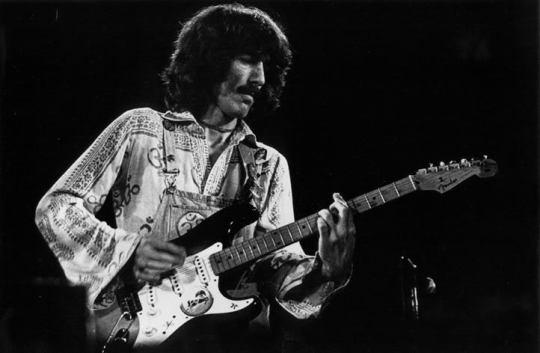
The Dark Horse Tour Rolling Stone article/review and its aftermath...
“If you get depressed, you start agreeing with them. If you start agreeing with them then you just go and do yourself in. But I’m, I wouldn’t do that because enough things happened to prove that it’s not exactly how they see it, you know. I mean, one situation with the rock press, for example, was one guy who came to write an article because he disagreed with another article that had been written in his paper. And so he said, ‘I’ve seen, you know, seven of these concerts and I disagree, and I want to write it from my point of view.’ Then his article came out and it was not really good at all, and I thought, well, he was just, just cheating me, you know, just to get in to talk to me. But then he wrote a letter to me and sent what he wrote, and to compare that to what they printed, he said they just cut it out, they just cut out any favorable references to the music or to the response from the audience. [...] These people… who supposedly loved me and I’m supposed to love them, and I see them, they’re just dropping apart at the seams with hate. This is… I’m talking about Rolling Stone, actually, talking about Jan Wenner.“ - George Harrison, radio interview, August 1975
“[Larry] Sloman was so upset he sent Harrison the original unedited draft of the story, to which Harrison responded, according to Sloman, ‘I’m glad you sent me that article, Larry. I thought you were an asshole and then I realized that it was Rolling Stone that was the asshole.‘“ - Sticky Fingers: The Life and Times of Jann Wenner and Rolling Stone Magazine (x)
“I was told George Harrison was reluctant to be included in Rolling Stone’s 25th anniversary portfolio in 1992—something about a mixed review of his 1974 album Dark Horse. He eventually agreed to a quick, simple portrait, but I wanted so badly to win him over. I knew he was an avid gardener and I had a deep appreciation of Paul Caponigro’s photographs of sunflowers, so I planned to bring some. A few days before our session, I did a shoot with Tom Petty for the same issue. When I told him George was on the fence, he said that the way to win George over was to bring ukuleles.
I brought 5. George was quiet but a willing participant. And after the shoot was over, as a gift, he picked up the Martin ukulele and played 20 minutes of Hawaiian love songs for us. The entire team sat down and listened to him. When we were finished, he turned to me and said ‘we’ll meet someday on the avenue,’ and headed to his car with the ukulele—which happened to be the most expensive one. When I told him it was a rental, he said with a wink, ‘You can bill Jann Wenner,’ Rolling Stone’s editor-in-chief.” - Instagram, February 26, 2021 (x)
#George Harrison#Jann Wenner#Larry Sloman#Rolling Stone#quote#quotes about George#quotes by George#1974#1975#1992#1970s#1990s#Mark Seliger#...karma *cough* Wenner. karma#Tom Petty#Harrison ukulele#fits queue like a glove
75 notes
·
View notes
Text
#Btw in case anyone cares I got just above the LSAT score I need to get into my top school!#So yay!#First poll#mclennon#ringo starr#george harrison#get back#Understanding Lennon McCartney#jann wenner#paul mccartney#the beatles#john lennon#mal evans
34 notes
·
View notes
Text
Lewisohn vs. Wenner Pt. 2 of 2
Part 1 // More Tune In analysis
You probably know the drill by now: I'm looking at the quotes from Tune In against the source Mark Lewisohn gives for them, and seeing if they're faithfully reproduced. This post deals with the multi-source Frankenquotes that are partly attributed to Jann Wenner's interviews. Five of the quotes here are from the infamous Lennon Remembers interview, with a sixth from a separate interview for Rolling Stone. Lewisohn combines John's words from these interviews with a myriad of other sources: a televised interview of John by Jean-François Vallée (1975), Hunter Davies’ The Beatles (1968), an interview/cohosting spot on The Mike Douglas Show (1972), and an interview with Lisa Robinson for Hit Parader (1975).
Before I get into it, I wanted to take a moment to discuss how I ‘grade’ Lewisohn’s quotes based on the type of source he cites. If Lewisohn is using a recorded interview, there’s some wiggle room in things like punctuation and word stress. When transcribing the same interview, two people might listen to the same phrase and come away with slightly different versions, e.g. “My favorite color was blue, but that changed after the accident in the paint factory,” vs. “My favorite color was blue. But that changed after the accident in the paint factory.” Both of those could be correct interpretations of the same recorded audio, so I can’t fault Lewisohn for changes along those lines when he’s working from an audio source.
There isn’t the same wiggle room when working from text. If I pull a quote from a book, and the book reads, “Now, I love green. It’s so lush,” I can’t change that to, “Now I love green; it’s so lush.” I’m not actually quoting the person who said those words originally—I’m quoting the transcribed and published version of what that person said.
I've taken this into account with these Frankenquotes. If there are punctuation differences between Tune In and the printed version of Lennon Remembers pictured here, I haven’t made note of them. Those same differences in a quote pulled from Davies’ The Beatles will be noted, since Lewisohn is quoting the printed source and not an original audio tape. This becomes a bit confusing when a single “quote” is compiled from different sources, and the bits from one source are graded on a different rubric than the other, but such is the thrill of fact-checking Mark Lewisohn!
Citations at the end. Time stamps refer to this upload of the Lennon Remembers interview.
Tune In 4-12 vs. Wenner p.76 (2:14:41), 18 (36:24) + Vallée Interview
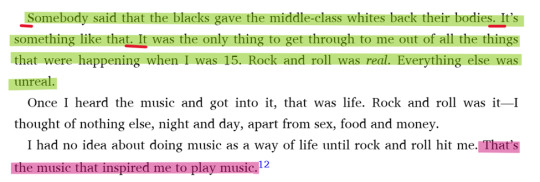


I haven't been able to track down the source for the middle section of this Frankenquote (it’s from an interview by Jean-François Vallée for the French TV Series Un jour futur, in the episode “Il était une fois: John Lennon.”), nor did I find the first sentence of the third part of the quote. It isn’t in the printed version of Lennon Remembers, and it doesn’t appear before the final sentence in the audio, though perhaps it’s elsewhere on the tape.
This has several classic Lewisohn offenses: stitching together multiple sources, combining distinct sections of a single source into one quote, and phrases omitted without ellipses. I've noted these on the images above.
What I'd like to bang on about is Lewisohn's choice not to clarify who John is referencing at the start of the quote--the "somebody" discussing black music and white bodies. In the original interview, John credits it to either "Michael X or Eldridge Cleaver" (Lennon Remembers gives this as Malcolm X, but it's clearly Michael X on the tape--see end of post for some background on Michael X and Lennon). It's common practice by many authors to clarify ambiguous references like this; Mark Lewisohn even does it in Tune In. He mostly does this in the endnotes (e.g. P-4, 2-22), but he uses a footnote to clarify a song lyric he himself uses in the prose of Chapter 4 (see footnote 4-c). Lewisohn not only fails to clarify who John is referencing here, he does not quote John's attempted attribution.
But maybe this falls under Lewisohn's inconsistent policy of not referencing the future. Still, even without naming the black activist who John references here, this quote is not a reflection of John's mindset in his adolescence: he wasn't sitting at a Quarry Bank chum's house in 1956, thinking "gee, thank goodness this black music has reconnected me with my middle-class white body!" The use of the above quote is foresight in and of itself, so why not credit the person who originated that line of thinking? Are Lewisohn's footnotes only for pronunciation guides and details of how demonstrably effeminate certain Beatles' relations were? For someone proclaiming their book a "social history", it's a bit of an oversight.
It's Eldridge Cleaver, by the way, in his prison memoir Soul on Ice (1968). It's in the chapter titled "Convalescence," in a discussion about the Beatles and white rock 'n' roll. Be forewarned if you seek it out, that section is also heavily homophobic.
Tune In 6-7 vs. Wenner p.133 (3:53:54) + Davies p.33



Hunter Davies did not record his interviews with the Beatles, as described in the introduction to the 2009 edition (p.lxiii): “I also wish now that I’d used a tape recorder. I never have done, which is silly.” Since we know Lewisohn was working with Davies’ written word, he was not at liberty to make changes like the one we see here: Davies starts a new sentence at the word “But”, which Lewisohn combines with the preceding sentence. There are changes like this throughout the quotes pulled from Davies’ work, but that’s a matter for a later post.
The other change Lewisohn makes here is more consequential. When discussing how Paul came to join the Quarrymen, John says, “That decision was to let Paul in.” Lewisohn gives the quote as “[my] decision was to let Paul in.”
Perhaps you’re thinking, “He’s used brackets! It’s fine!”, but I disagree. Brackets can be used when changing the tense of a quote, or when changing a word to clarify the meaning of a quote, so long as doing so doesn’t change the meaning. Clarification isn’t necessary here: the quote, as stated by Lennon, would make sense in the context Lewisohn provides. There’s no confusion about what decision John is discussing here.
But this change isn’t simply superfluous—it actually changes the meaning of the quote in a way that’s only clear if we look at the source. Here’s what immediately precedes the quote:
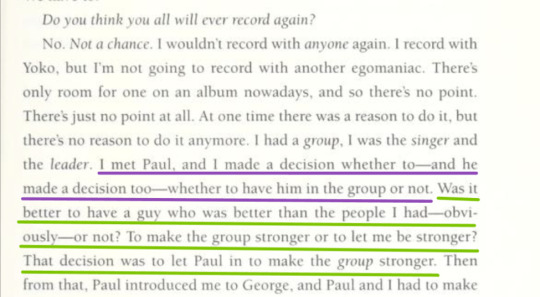
“I met Paul, and I made a decision whether to—and he made a decision too—whether to have him in the group or not.” Emphasis mine.
So John is not talking strictly about his decision, he’s talking about Paul and his mutual decision to work together. Without this context, even without the change from “that” to “my”, John seems to be discussing his own decision. Lewisohn’s change is completely unnecessary to get across his point. It’s as if he made this change specifically to push back against John Lennon’s assertion that a young Paul McCartney had autonomy and didn’t simply exist to satisfy John’s whims.
Tune In 8-4 vs. Wenner p.133-4 (3:54:42) + Davies p.44-5
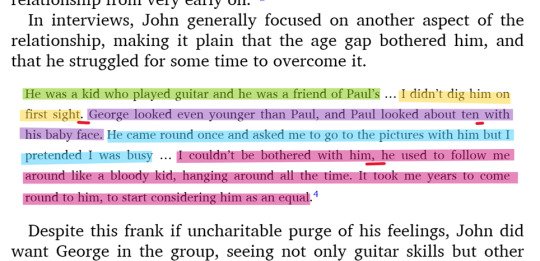

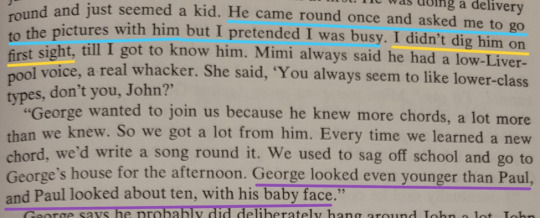
Color-coded to show the absolute chopped salad Lewisohn made of these two sources.
Also of note is Lewisohn’s follow-up to this quote, “Despite this frank if uncharitable purge of his feelings….” Lewisohn does this elsewhere (notably with John’s quote about hitting women): he follows up a self-critical quote from John with an authorial “Aw, don’t be so hard on yourself, buddy!” It’s unnecessary.
Tune In 8-28 vs. Wenner p.140 + The Mike Douglas Show


Lennon: He’s the greatest rock ‘n’ roll poet, and I really admire him.
Douglas: Do you feel the same today as you did years ago in Liverpool about rock?
Lennon: When I hear rock, good rock, of the caliber of Chuck Berry, I just fall apart and I have no other interest in life. Y’know, the world could be ending if rock ‘n’ roll’s playing, y’know. It’s a disease of mine.
I wasn’t able to find this quote in the interview audio, but I’m sure its there somewhere. I used Lennon Remembers as a guide to find the correct location of a certain segment in the 4+ hour audio, and it is apparent that certain parts of Lennon Remembers have been reordered.
I transcribed this section of the Mike Douglas Show from a video posted on the Shanghai-based streaming app BiliBili - see link in my source list.
Lewisohn uses an ellipsis to indicate a transition between two totally different sources here but does not use an ellipsis to indicate the phrases he left out of the Wenner interview. There are several small changes to the quote from the Mike Douglas show as well, but the meaning is retained.
Tune In 22-78 vs. Robinson 1975 + Wenner p.122 (1:33:20)

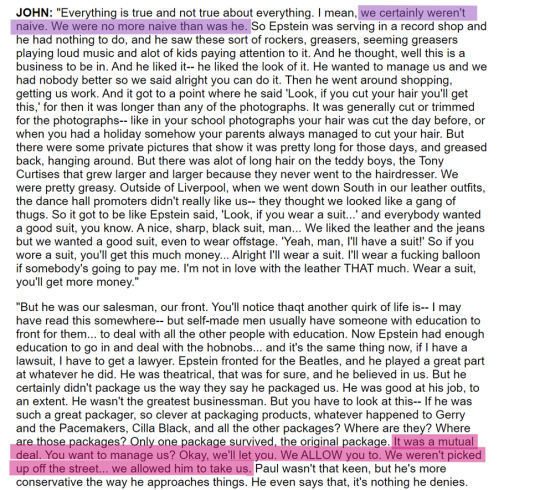

The first source here is Lisa Robinson’s 1975 interview with John for Hit Parader. You can find a version of this interview here. Note the lack of ellipsis between the purple and pink sections, despite the lengthy omission between them.
Lewisohn does use an ellipsis in the Wenner-derived portion of this quote, but he doesn’t place it correctly. The omission occurs between “and” and “Brian”, not between the rest of the quote and “and Brian.”
It wouldn’t make sense to include Allen Klein and Yoko Ono in this quote as it appears in Tune In, since they won’t appear until much later in the series, but I do wonder if presenting the quote without their names truly preserves the quote’s meaning. However you feel about them personally, Allen Klein and Yoko Ono are two of the most controversial figures in Beatles’ history. Within a few years of this interview, John would be on the outs with Allen Klein. John describes himself as someone who “make[s] a lot of mistakes character-wise”, and goes on to list three examples of his good judgments. Two of those are Allen and Yoko. Is it intellectually honest to delete those two names from the list and present Brian as the one example of John’s character judgment?
And our final Wenner Frankenquote. This one isn’t from Lennon Remembers, but from a 1970 Rolling Stone article titled “The Beatles: One Guy Standing There, Shouting ‘I’m Leaving’.”
Tune In 22-72 vs. Wenner 1970 + Robinson 1975



This one is audacious enough to warrant its own post—and we’re in luck! I defer to @mythserene's post for proper analysis. You can also find this one discussed in @anotherkindofmindpod's "Fine Tuning: Ep 7 Spanner in the Works."
In brief, in the ‘quote’ lifted from Wenner’s interview, John is using “Epstein” as a stand-in for Klein. John’s not saying “Three of us chose Epstein”—he’s saying “Three of us chose Klein, throw aside your assumptions about him for a minute.” It’s not the sort of quote you can divorce from its context if you have any credibility.
Some Context on Michael X and John Lennon:
Michael X (a.k.a. Michael Abdul Malik, born Michael de Freitas) was born in Trinidad and became a prominent member of the black Power movement in 1960s London. Lennon met Michael X early in 1970 and became a devoted supporter and advocate until Malik’s death in 1975 (Wiener 1991, p.115-123). Here’s a brief rundown of their involvement:
Since you’re the sort of person who reads citation-by-citation analyses of Beatles books, you have probably seen pictures from early 1970 of John and Yoko sporting matching pixie cuts. In January 1970, John and Yoko shaved their heads (as a publicity stunt, I assume?), and kept their shorn hair in a bag. This bag of hair was the centerpiece for their first public interaction with Michael X: in February 1970, Lennon and Ono gave Malik their bag of hair, and he gave them a pair of Muhammad Ali’s shorts. The press was very much present, but they failed to make headlines (Doggett 118). The hair was supposed to be auctioned off at Sotheby’s to support Malik’s Black House, but this fell through (see Lennon on The Dick Cavett show here.) Pictures of the event can be seen at The Beatles Bible.
Malik fled London for his native Trinidad when legal issues loomed in 1971. He started a commune there, which John visited in April of the same year. In 1972, the bodies of Joseph Skerritt and Gale Benson were found on the commune (Weiner 1991, p.118). Malik was convicted of ordering the killing of Skerritt and would be hanged for that crime in 1975 (NYT 1975 May 17).
Malik may or may not have ordered Skerritt’s murder, but regardless, he did not have a fair trial. John and Yoko campaigned from the time of his conviction up until his death for clemency, without result (Weiner 1991, p.119-123).
Sources:
Cavett D [host]. 1971 Sept 11. Interview with John Lennon and Yoko Ono. The Dick Cavett Show. Accessed online on 2024 Feb 23. Available from: https://ghostarchive.org/varchive/7kXCnKfdGOY.
Cleaver E. 1968. Soul on Ice. New York (NY): Dell Publishing Co., Inc. 210p. Accessed online. Available from: https://archive.org/details/soul-on-ice-by-eldridge-cleaver/
Davies H. 1968. 2009 Edition. The Beatles. New York (NY): W.W. Norton & Company. 408p.
Doggett P. 2009. You Never Give Me Your Money: The Beatles After the Breakup. New York (NY): HarperCollins. 390p.
Douglas M [host]. 1972 Feb 16. Season 11 Episode 123. The Mike Douglas Show with John Lennon & Yoko Ono. Accessed online 2024 Feb 23. Available from: https://b23.tv/mQMUDg9
Militant Is Hanged by Trinidad After Long Fight for Clemency. 1975 May 17. New York Times.[Internet] [cited 2024 Feb 24]. Available from: https://www.nytimes.com/1975/05/17/archives/militant-is-hanged-by-trinidad-after-long-fight-for-clemency.html
Robinson L. 1975 Dec. Interview with John Lennon. Hit Parader. Accessed Online from www.beatlesinterviews.org. Available from: https://web.archive.org/web/20230409044146/https://www.beatlesinterviews.org/db1975.1200.beatles.html
Wenner JS. 1970 May 14. The Beatles: One Guy Standing There, Shouting ‘I’m Leaving’. Rolling Stone. Accessed online. Available from: https://web.archive.org/web/20231017203039/https://www.rollingstone.com/music/music-news/the-beatles-one-guy-standing-there-shouting-im-leaving-43403/2/
Wenner JS. 1970. 1970 12 08 John Lennon Interview, Rolling STones Lennon Remembers, Complete Unedited [video]. Youtube. 2022 Apr 18, 4:26:50. Accessed 2024 Feb 18. Available from: https://www.youtube.com/watch?v=-YelhzUbrCE
Wenner JS. 1971. 2000 ed. Interview with John Lennon and Yoko Ono. Lennon Remembers. London: Verso. 151p. Accessed online. Available from: https://archive.org/details/lennonremembers00lenn_0/
Wiener J. 1984. 1991 Illini Books ed. Come Together: John Lennon In His Time. Urbana: University of Illinois Press. 379 p. Accessed online. Available from: https://archive.org/details/cometogetherjohn00jonw/
#mark lewisohn#tune in#the beatles#john lennon#jann wenner#lewi-sins#it's A LONG ONE#sorry#next post: pt 1 of my kim bennett manifesto#edit bcuz i forgot to add my sources...lewisohn moment
17 notes
·
View notes
Text
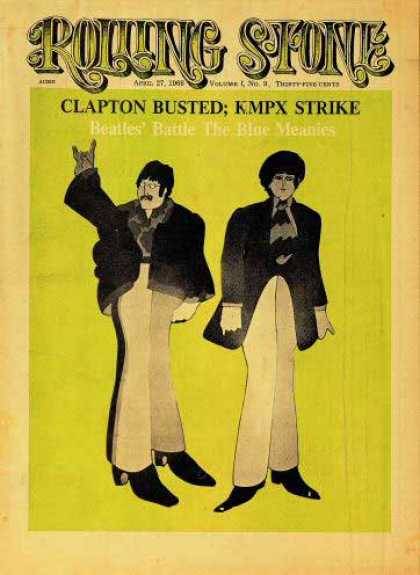

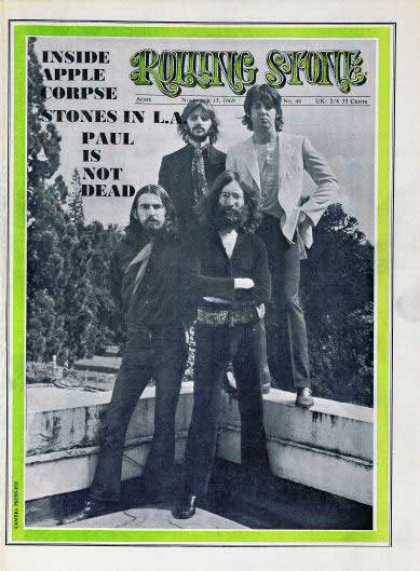

Beatles on Rolling Stone Magazine | 1968-1970
Graphic designers were fighting for their lives back then...
#The Beatles#Beatles#paul mccartney#john lennon#george harrison#ringo starr#rolling stone magazine#rolling stone#jann wenner#wings#green#yellow
30 notes
·
View notes
Note
Hey, there! So how are we feeling in AKOM land about the downfall of the King of All Jean Jackets? Jann Wenner was single-handedly responsible for most of the ‘80s rock press derision of Paul, so to see him fall from grace so spectacularly is satisfying AF.

28 notes
·
View notes
Text
❝ I ran into Paul McCartney here and there over the years. He’d been to my house a few times, but we never had a serious talk or a big hangout. He was incredibly polite, and his Beatle magic was powerful stuff, with an accent that could melt you at fifty feet. Lennon Remembers had hurt Paul, but his relationship with Rolling Stone was always good, producing many interviews and covers. Still, we remained the keepers of the flame for John. I thought Paul was angry about that, but perhaps I was imagining it, steeped as I was in Yoko’s partisan anti-McCartney stance and my loyalty to her.
Paul was putting out his first new album in seven years and wanted to line up support from Rolling Stone. When he came to pick me up for lunch at the office, staff were standing by their doors. The only more remarkable reception was when Jerry Lee Lewis walked down the hallway amid a standing ovation. Paul, for his part, was delighted to shake every hand and answer every question. He was enjoying himself. The fairy dust was everywhere. Our lunch was gossipy and relaxed. Paul was anxious to talk about John, and kept coming back to him. He wanted to make sure I understood the depth of his love. John was a complex, difficult character, and Paul’s feelings, however competitive and conflicted about credit, were nonetheless pretty simple. Paul didn’t want to be in a fight with the John cult; he wanted to be a part of it.
We went over to the studio and he played me his next record, New. The music struck me as more in tune with the times, while Paul’s songwriting seemed more in touch with his own history, including his early days with John. Paul was looking inward, trying to reach the level of honesty and depth that John had. His melodies and his voice were soft and pretty, lovely. I could hear him making a reach with this album, historic in his own arc.
When I told Yoko about my visit with Paul, she said something to the effect that I had fallen under his spell. She was a hard-ass about it and had her reasons, but I didn’t want to be a party to it anymore. I thought that Sean should have a solid relationship with his deceased father’s oldest friend. Paul had finally reconciled with his own feelings about John. We were all growing up.
The show Paul did that week in Brooklyn was joyous, a lot of stage business and fireworks at the end. He embraced his heritage and the achievements of the Beatles. He was celebrating the Fab Four and dedicating songs to John. All you need is love! ❞
– Jann Wenner, Like a Rolling Stone (2022)
#Jann Wenner#The Beatles#Paul McCartney#Yoko Ono#John Lennon#(Hmm Jann really putting an emphasis here on the Paul vs Yoko narrative)#(“with an accent that could melt you at fifty feet”)#(Alright Jann.)#Like a Rolling Stone
191 notes
·
View notes
Text
Sticky Fingers, by Joe Hagan:
- I love that Jann Wenner hired Joe Hagan to write his official biography, and then agreed not to have any editorial control over it.
- I love that he made a whole career out of interviewing people and then writing down things they didn't want him to write down, and he still went into the whole thing sure it wouldn't happen to him.
- I love that he handed over all these letters and records and contracts and taped conversations (there was a bit in the seventies where they just taped every phone call) from this enormous archive, dating back decades, and gave the author access to almost everyone involved. I love that they were all just honest about what a shit Jann was and Joe Hagan wrote that down.
- I love his mother. And his wife. And Annie Leibovitz. They're easily the three most interesting people in the book.
- I love the bit where he is having an affair with Art Garfunkel and his wife is having an affair with Paul Simon and it's very unclear who is trying to hurt who the most.
- I'm sad that Paul Simon refused to be interviewed, I assume he assumed that an official biography wasn't the place for all his feelings of writhing hatred, but it was, it really was.
- I love that it makes it so clear what a shit magazine Rolling Stone always was, and how zero care Jann Wenner had about any of the politics. Rolling Stone was never actually a voice for anything more than very needy men wanting to seem very cool in their wanky little minds.
- I genuinely love how actively he was against the political side of it all and didn't understand why he would care. I love that he purposefully decided it should be a gossip magazine full of drivel.
- I love the bit where the few political writers at Rolling Stone who still hoped it might stand for something, rebelled. And they published stuff they wanted to publish while Jann was out of town and it was their best selling issue and he immediately gladly took all the credit for it, while his writers seethed gently. I love that it happened twice.
- I hate that it felt like every time he was on the cusp of ruin a major star would die and boost sales and everyone would pretend he was wonderful again.
- I love the bit where Jann was probably having an affair with Richard Gere and he pasted shirtless photos of him into his scrapbook.
- I love that he keeps a scrapbook of invitations, letters, photos and articles as proof that famous people love him and like him. I love that Joe Hagan describes it as: The physical evidence of the story Jann Wenner told about himself. <3333
- I love how often people fall out with him and then NEVER speak to him again. I love that there's almost not one big thing you can point to about why he's a dick... I mean no, there are things, there's a moment early on, where he has sex with a girl and then has a dinner party the next night and uses their stained sheets as a table cloth in order to embarrass her, you know, there are a lot of things you could point to. But I think what I mean is there are also just SO MANY different ways he's just dreadful that it's almost unexplainable. He's incompetent and needy and horrible and just excruciatingly wanky. But he's not like a cartoon villain. He's just a bubble of disgusting ego.
- I think there was maybe one bit where I started to feel a bit sorry for him, like I guess if you tell someone everything about yourself, and how wonderful you are, and then they interview all your friends and you expect them to write about your magnificent business empire and how golden you are then... it's hard if this is the book they write. But whatever. I don't care enough to care, I just sat back and enjoyed the truthiness.
#sticky fingers#jann wenner#joe hagan#I didn't make a lot of notes while I was reading sticky fingers#but I found this in my drafts#beatles books#(aware it's very much not really a beatles book -#but for my own tagging purposes it sort of is)
41 notes
·
View notes
Text
The history of Rolling Stone largely has been one of either exclusion or minimizing the contribution of women and men, of Black men and Black women.
I think you have to look at the history of the magazine. I think from the founding in the 60s, all the way into maybe the 90s, I don't think that they had a Black staff writer. They had very few women writers. So there wasn't a lot of outside voices in those offices.
Moreover, what's really frightening or sort of sad about his comments is that because Rolling Stone was essentially the gatekeeper, the seminal voice of youth culture, at least perceived by the mainstream, they defined what the canon of Rock and Roll was. And they defined the canon of Rock and Roll in very narrow terms that basically celebrated white men with guitars who Jann Wenner liked. So when you have that as your criteria, it kind of limits who you celebrate as greats.
So these comments really showed the way that gatekeeping excluded these other voices.
And the thing about Rolling Stone also to remember is, because it had such an outsized voice, as the voice of sort of Rock music culture, or even youth culture at one point, it affected how TV programmers programmed it, effected radio, and effected newspaper coverage. So who they deemed to be important and it resonated throughout. And who they deemed not to be important, resonated throughout.
So if you were a white rock band named Kansas, or Boston, or Chicago in the 60s or 70s, you got more coverage than Chaka Khan or Parliament, Funkadelic or Earth Wind and Fire.
Well, he called his book The Masters, and that was already the first step. If the book was called, My Favorite Rock Stars, I think we all would have felt, oh, it's a little narrow, but that's who Jann is. But by calling it The Masters, he suggests that these guys are the masters of a genre of music that helped define America in the last half century. And that's going to get backlash, particularly when it doesn't include Marvin Gaye, or Joni Mitchell, or Stevie Wonder, and the list could go on.
—Nelson George, responding to Jann Wenner’s racist sexist comments on Rock & Roll, a music genre created and popularized by Black people
#racism#jann wenner#rolling stone#nelson george#white supremacy#rock n roll#gatekeepers#rolling stone magazine#misogyny#sexism#casual racism#aversive racism
38 notes
·
View notes
Text


1968.
Rolling Stone publisher Jann Wenner said the assassination of Martin Luther King Jr. "meant little or nothing to the majority of the American people."
12 notes
·
View notes
Note
"Rolling Stone Magazine founder Jann Wenner: Women And Black Artists Not Intellectually Articulate Enough" this the kind of person HS was/is dying to please. for $$$$.
I’m at a loss for words. I didn’t know Jann Wenner was a caveman.
8 notes
·
View notes
Text
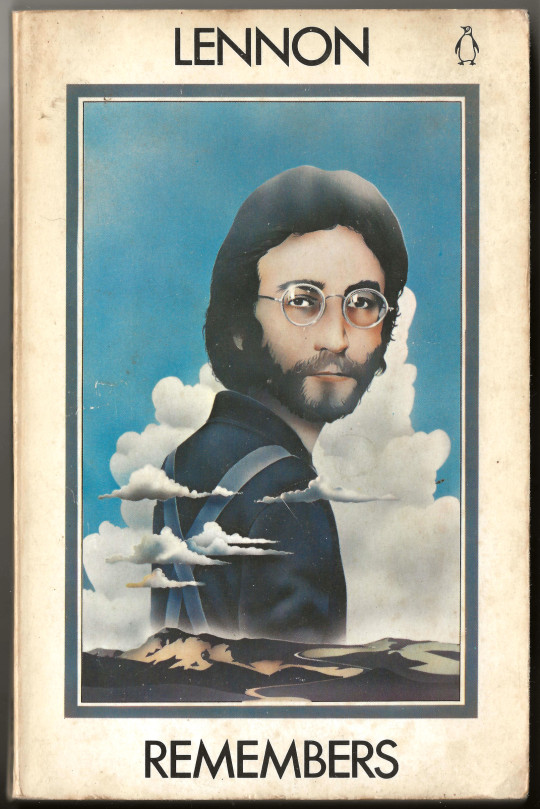

Lennon Remembers: The Rolling Stone Interviews by Jann Wenner with a a cover by Philip Castle.
5 notes
·
View notes
Text
These particular stars were his de facto business partners in the formation and success of Rolling Stone—stars whose images sold magazines on the newsstands, and who, after Wenner allowed them to edit their own interviews, became social friends. At one time, Mick Jagger was a literal business partner in a British edition of Rolling Stone. Jann went sailing with Mick. He vacationed and shopped with Bruce. Bob Dylan flew a private jet to Jann’s house in Sun Valley and played guitar with his son. Bono personally helped him sell advertising by meeting and greeting with automakers in Detroit. Wenner built his business and reputation on his 1970 interview with John Lennon, with whom he made a handshake deal promising that John Lennon actually owned the interview.
These were not interviews, but transactions. The exchange was clear: These artists helped Wenner sell magazines and he helped emphasize their iconography through expansive coverage. How many covers has Mick Jagger had? At last count, at least 24. Wenner personally placed U2 at the top of a best-albums-of-the-year list in 2014, “by fiat, buddy,” he said.
Rolling Stone was crony capitalism, not culture.
It never occurred to me that it was this deliberate or explicit, but it's hard to miss when U2 gets best album of the year in 2014! 🤣
7 notes
·
View notes
Text
Lewisohn vs. Wenner Pt. 1 of 2

I kid, I kid! Of course I'll adjudicate things between these lads.
I'm working on the follow-up(s) to my Kim Bennett post, but I lack the degree of coherence necessary to finish them at the moment. My household has been hit with Covid and influenza, so I'm too sleep deprived to string together a proper point. But I can still check citations, baby!
Today we're tackling a fun source: Jann Wenner, co-founder of Rolling Stone magazine and early-70s confidante of the LennOnos. Mark Lewisohn quotes interviews conducted by Jann Wenner ten times in Tune In; nine of those quotes had issues. Nine of the ten quotes come from the infamous Lennon Remembers interview (conducted in Dec. 1970 and first published in Jan. 1971); the other one is from a different 1970 interview for Rolling Stone. A few of these have been covered by @mythserene; I've included links to her analysis.
About half of Lewisohn's Wenner-sourced 'quotes' are Textbook Multi-Source Frankenquotes. Lewisohn does this quite brazenly--if you look at the text of the endnote, it will say something like "First and third parts of quote from Bip Bop Weekly, second part from interview with...." The multi-source quotes will appear in part two; this post will include the single-source ones.
Pictured text is from Lennon Remembers (Verso, 2000 ed.), but I made my comparison against the audio of the interview. You can listen to it on YouTube here. I've included time stamps as well as page numbers for each quote.
Tune In 33-2 vs. Wenner p.65 (1:49:24), 145-6 (4:16:43)
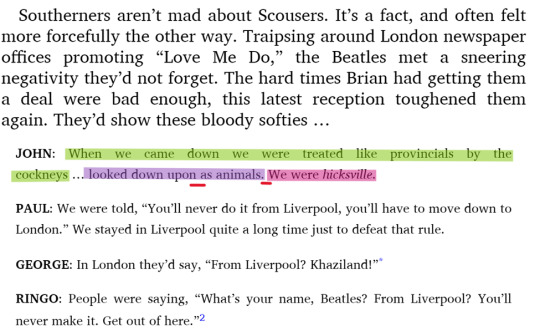


I do not like the way Lewisohn wrote/cited this--each quote from the Beatles is pulled from a different source, but it's presented almost as a dialogue. It would be simple stuff to slap an endnote after each quote giving its source, rather than using a single endnote for all four separate quotes.
That's just a quibble, but this quote delivers a big issue as well. See that ellipsis? Lewisohn is letting you know that he left out over two hours of recorded interview between the first and second parts of this quote. You can use an ellipsis to omit a few words or a sentence or two in the same passage--you can't use it to omit multiple hours of conversation.
An ellipsis would be perfectly acceptable between the fragment and the final sentence, but Lewisohn chose not to use one.
Tune In 24-33 vs. Wenner p.63 (1:44:58)

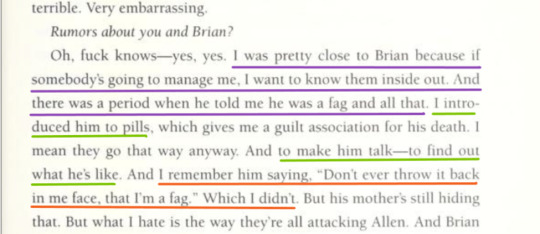
I have come to love those instances were Lewisohn throws in one token ellipsis as if that will distract from the fact that he completely scrambled the order of the sentences.
Tune In 31-44 vs. Wenner p.27 (54:46)

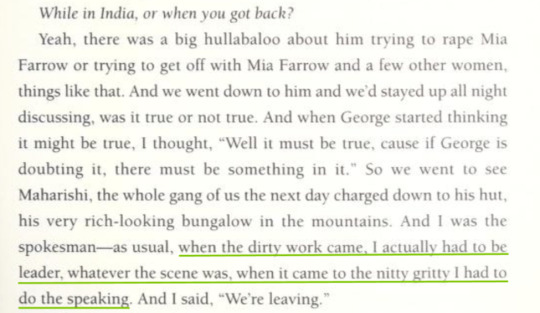
@anotherkindofmindpod discussed this in their Fine Tuning series - I believe in the episode "Leader Lennon." I won't hit it too hard.
As you can see, the context in the source text is wildly different from its use in Tune In. In the original, John is discussing confronting the Maharishi about rape allegations. In Tune In, Lewisohn uses it in the context of….discussing a song choice with George Martin. A bit different. John does imply some universality in the source quote (“as usual”), but this still seems like a stretch. Also note the omission of the word “actually” in the phrase “I actually had to be the leader,” which, to my reading, implies that John wasn’t constantly in Leader Lennon mode, unless the others were forcing him to handle the dirty work.
Sources:
Wenner JS. 1970. 1970 12 08 John Lennon Interview, Rolling STones Lennon Remembers, Complete Unedited [video]. Youtube. 2022 Apr 18, 4:26:50. Accessed 2024 Feb 18. Available from: https://www.youtube.com/watch?v=-YelhzUbrCE
Wenner JS. 1971. 2000 ed. Interview with John Lennon and Yoko Ono. Lennon Remembers. London: Verso. 151p. Accessed online. Available from: https://archive.org/details/lennonremembers00lenn_0/page/151/mode/2up
13 notes
·
View notes
